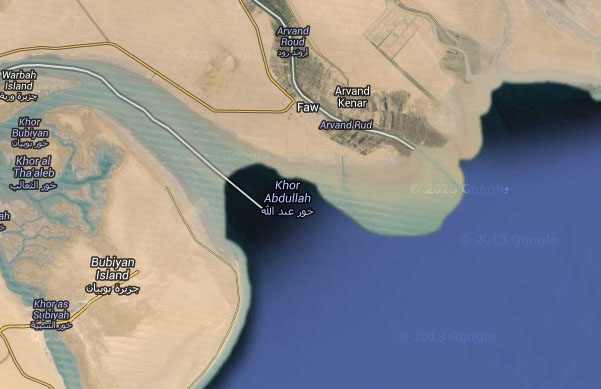Water borders deal with Kuwait ignites political outrage in Iraq

The Khor Abdullah waterway between Iraq and Kuwait.

On Tuesday, the government of Prime Minister Haider al-Abadi ordered to proceed with the 2012 agreement with Kuwait to demarcate water borders and organize maritime activity at Khawr Abdallah bay. It stressed it could not backtrack on the deal without the consent of the Kuwaiti side.
After the Iraqi invasion of Kuwait, Iraq declined to partake in United Nations-sponsored negotiations to demarcate water borders between the two countries, which prompted a panel formed to address the issue to proceed with its own drawing of borders in 1993, Sputnik agency quoted legal experts as saying. The government’s recent decision was an enforcement of a parliament legislation applying that border plan, they added.
But the government’s decision was met with outrage among parliamentarians who accused it of giving up Iraqi territory to Kuwait.
Alia Nassif, an MP from the State of the Law bloc, a coalition led by Vice President Nouri al-Maliki, said “the cabinet voted for giving the canal to Kuwait and has allocated US$750.000 to demarcate water borders though everyone knows it is a purely Iraqi property.” She stressed that international resolutions do not address the canal, accusing the government of “deceiving the Iraqi people”.
Awatef Naama, another MP from the “Reform Front”, said the UN Security Council’s 833 resolution gave Iraq “absolute navigation rights” at the creek, something which, she said, has been given up by proceeding with the deal with Kuwait.
Abdul-Salam al-Maliki, an MP from Basra, the closest province to the disputed canal, urged citizens at his constituency to stage protests opposing the agreement, and to collect signatures backing “the independence of Basra” should the government stick to the deal. He said the agreement renders Iraq “enclosed” in the maritime sense, adding that the cabinet’s decree “eliminated our sovereignty over the last waterway connecting us to the open seas”.
But another MP, Amal Attiya, said the cabint’s decision was merely an enforcement of past UN resolutions. “(The decision concerning) organizing navigation was based on arrangements approved by the United Nations, and the rights ceded by the former regime),” she said, referring to the regime of late president Saddam Hussein. “The Iraqi people are now paying the price for the rights ceded by the former regime”.
